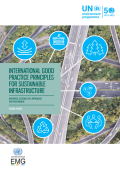
This ACER assessment identifies several areas where policy-makers could put further emphasis to future-proof the current electricity market design.

The International Good Practice Principles for Sustainable Infrastructure set out ten guiding principles that policymakers can follow to help integrate sustainability into infrastructure planning and delivery. They are focused on integrated approaches and systems-level interventions that governments can make to create an enabling environment for sustainable infrastructure.

This report assesses the market potential, policy frameworks, as well as implementation challenges and risk management with regard to turning waste issues into an opportunity that will deliver environmental, climate and socio-economic impacts.

This report analyses Nationally Determined Contributions (NDC) submitted by 44 GGGI members with a particular focus on the strategies set out for mitigating contributions from the transport sector.

A report by the United Nations Environment Programme (UNEP), International Principles of Good Practice for Sustainable Infrastructure states that the development of sustainable infrastructure is essential to combat climate change, improve public services, and drive COVID-19 economic recovery. It urges planners and policymakers to take a more systematic approach to sustainable infrastructure, integrating it into their long-term development plans and ensuring that man-made systems work in tandem with natural systems. In addition, UNEP has released a companion publication to the International Principles of Good Practice for Sustainable Infrastructure, "An Integrated Approach in Practice," showcasing innovative approaches to sustainable infrastructure development in a number of countries.
联合国环境规划署(UNEP)的一份报告《可持续基础设施的国际良好实践原则》指出,发展可持续的基础设施对于应对气候变化、改善公共服务和推动 COVID-19 经济复苏至关重要。它敦促规划者和决策者对可持续基础设施采取更系统的方法,将其纳入他们的长期发展计划,并确保人造系统与自然系统协同工作。此外,环境署还发布了《可持续基础设施的国际良好实践原则》的配套刊物《实践中的综合方法》,展示一些国家通过创新方法来发展可持续基础设施
